Tyler Goodwin
Wells, Maine
Follicular Lymphoma
Transplanted in 2017
CAR T-cell Therapy 2018
Many thanks to the American Society for Transplantation and Cellular Therapy for helping us share Tyler’s story.
The year Tyler Goodwin, a devoted dad and life-long “Mainer,” turned 54, things were going swimmingly. He’d just accepted a terrific new job; he and his ex-wife, Alicia, were enjoying a friendship rare for most divorced couples; and their kids -- Theresa and Tyler Jr. -- were thriving as young teens.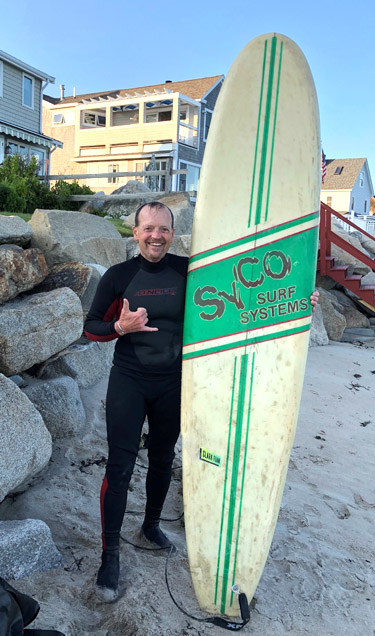 Tyler recalls, “We were in a happy life.”
Tyler recalls, “We were in a happy life.”
 Tyler recalls, “We were in a happy life.”
Tyler recalls, “We were in a happy life.” Then, after a hockey game, Tyler discovered a “golf ball-sized” lump near his groin. Quickly, the year 2017 took Tyler through diagnosis (follicular lymphoma), many rounds of treatment (including “B & R” chemotherapy, R-CHOP and eventually an autologous stem cell transplant) and right up to the brink of despair, when he learned he’d relapsed.
As Tyler recalls, “My oncologist said, ‘I hate to tell you, but it’s back.’” This was all the more terrifying, because doctors had earlier implied “…that I was dead if the transplant failed, and it failed.” Luckily, in the months since that dire prediction, a new treatment was emerging. Tyler’s doctor at Dana Farber Cancer Institute told him, “There is a clinical trial for a process called CAR-T cell Therapy going, and there is one spot available. You would be one of fifty people in the world to enter the trial.” Tyler went from “designing my urn” to embracing a thread of hope.
“A month prior to my transplant, on the nightly news,” Tyler remembers, “I had seen the story of Emily Whitehead -- the first successful pediatric CAR-T cell recipient -- testifying on Capitol Hill for FDA approval… I had written her name and the words “CAR-T cell Therapy” in the Notes app on my phone… thinking it might be something I’d need down the road, maybe five years out.”
If Tyler entered the trial, there was no guarantee he’d be cured, and no definitive outline of what he might face during treatment. But, Tyler recalls, “I immediately thought of Emily’s story… I told myself -- if a six-year-old can do it, so can I!”
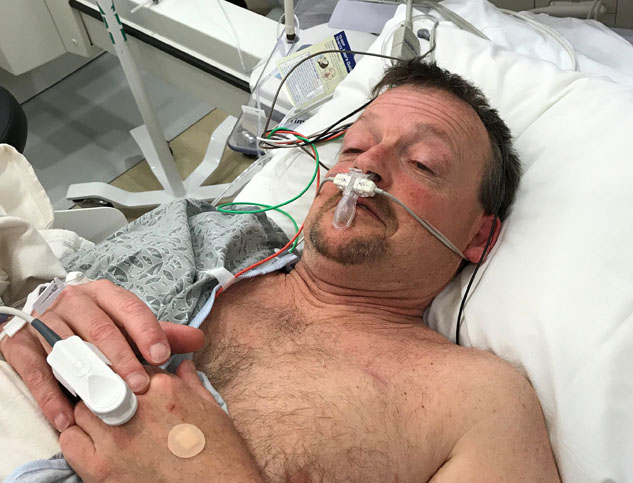 But first, Tyler says, “They put me through every test known to man. I was so sick, with fluid in my head and pneumonia, I thought how are they gonna let me into this thing? I can’t pass, I can barely breath.” Tyler credits his brother, Dale, for helping him through this time, “He really stepped up and took the job of caregiver seriously!” “Finally,” he recalls, “they called and said, ‘You’re accepted!’”
But first, Tyler says, “They put me through every test known to man. I was so sick, with fluid in my head and pneumonia, I thought how are they gonna let me into this thing? I can’t pass, I can barely breath.” Tyler credits his brother, Dale, for helping him through this time, “He really stepped up and took the job of caregiver seriously!” “Finally,” he recalls, “they called and said, ‘You’re accepted!’” As it turned out, Tyler would need all of Emily’s grit, and then some. For him, as for many early patients, the first iterations of CAR-T cell Therapy were a rough ride. “When the T-Cells are doing their job of eradicating cancer,” Tyler says, “they create a firestorm of immune system responses. High fevers, chills, aches, low blood pressure, neurological issues. I was in an altered mental state for ten days… I could not answer simple questions or perform simple tasks.... I lost 30 pounds and could not write my own name on the day they wheeled me out to go home.”
At home, Tyler’s fatigue lingered for weeks; “it was hard just to lift up a glass of water.” Gradually, Tyler’s stamina, and motor and language skills returned, and his risky decision was affirmed. “I would have been gone without CAR-T. It not only put me into remission, it put me into remission without any long-term side effects!”
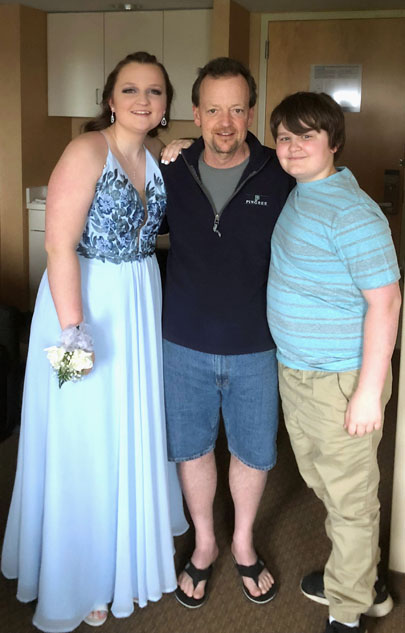
During the most harrowing periods of his illness, Tyler’s kids supported him with an inventive kindness. Theresa surprised her dad by appearing at his bedside on the night of her prom. Tyler recalls, “That afternoon, as I was… sick from the chemo and sad from missing prom night, I get a knock on the door. To my surprise it was my daughter in her prom dress! My ex-wife drove her and her date all the way down to surprise me! We were able to take photos and I was a part of the night after all.”
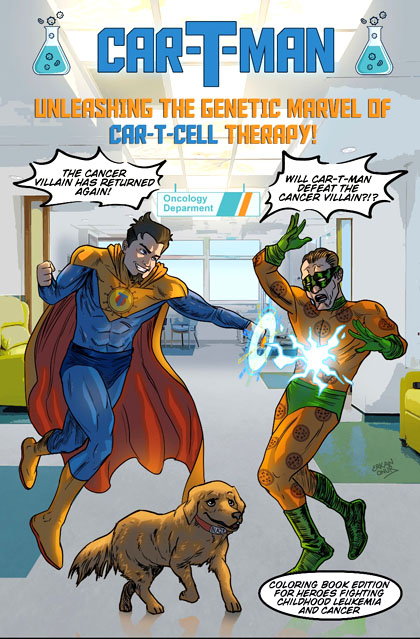 Tyler and his son together created a comic book hero. Tyler describes their project: “When I realized my blood would be genetically modified in the trial, I thought about how most superheroes have a story of genetic mutation... So, my son and I created a superhero-type character called CAR-T-Man.” Ultimately, Tyler created a coloring book featuring CAR-T Man as a hero who vanquishes the villain, cancer, “once and for all!” Ultimately, Tyler says, “CAR-T Man gave both me and my son confidence going into the procedure. It’s story of hope and inspiration and the power of how one person’s story, like Emily’s, can be incredibly impactful.” As Tyler sees it, “Emily saved my life, and maybe I can do the same for others.”
Tyler and his son together created a comic book hero. Tyler describes their project: “When I realized my blood would be genetically modified in the trial, I thought about how most superheroes have a story of genetic mutation... So, my son and I created a superhero-type character called CAR-T-Man.” Ultimately, Tyler created a coloring book featuring CAR-T Man as a hero who vanquishes the villain, cancer, “once and for all!” Ultimately, Tyler says, “CAR-T Man gave both me and my son confidence going into the procedure. It’s story of hope and inspiration and the power of how one person’s story, like Emily’s, can be incredibly impactful.” As Tyler sees it, “Emily saved my life, and maybe I can do the same for others.” It’s been six years since the trial and, Tyler says, “every single scan reinforces the miracle that CAR-T has brought to me and my family. “Tyler continues, “I’m alive with what was once an incurable cancer. It’s a good feeling to know I helped bring a drug to market. It is not yet 100% effective, but I truly believe it is opening doors and paving the way to a cure for cancer someday.”
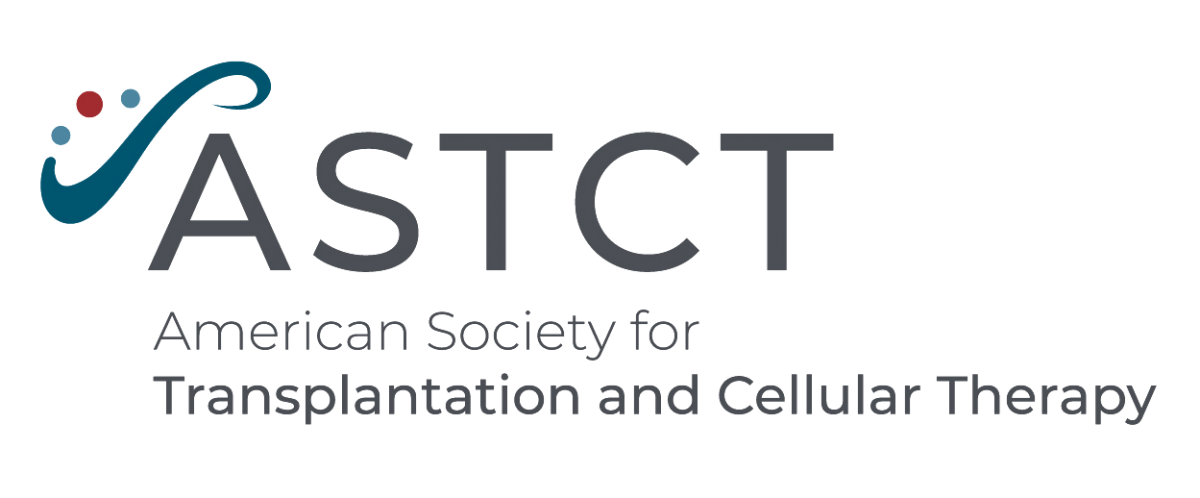
The American Society for Transplantation and Cellular Therapy (ASTCT), formerly known as the American Society for Blood and Marrow Transplantation, is a professional society of more than 2,200 healthcare professionals and scientists from over 45 countries who are dedicated to improving the application and success of blood and marrow transplantation and related cellular therapies. ASTCT strives to be the leading organization promoting research, education and clinical practice to deliver the best, comprehensive patient care.
English
